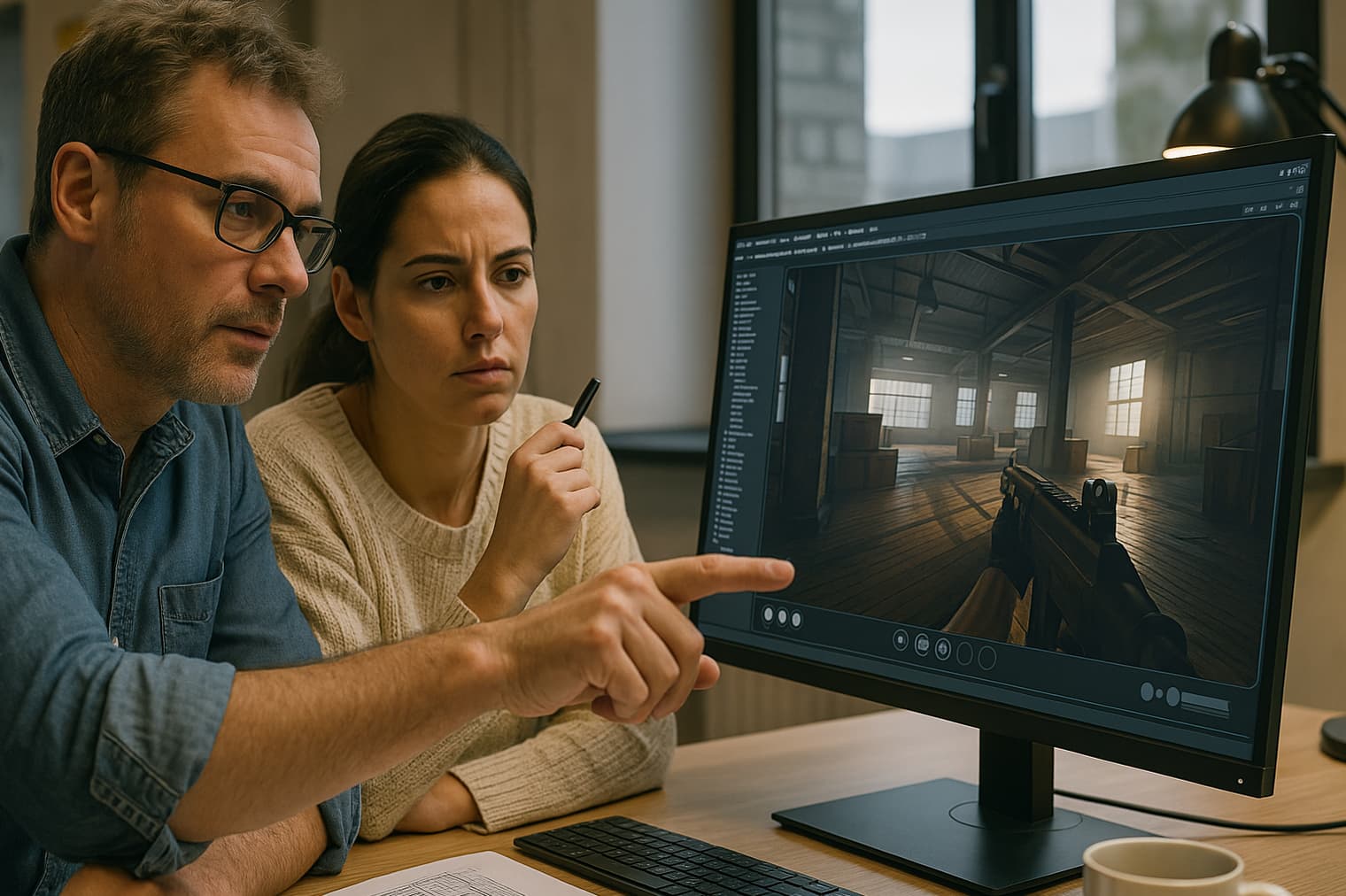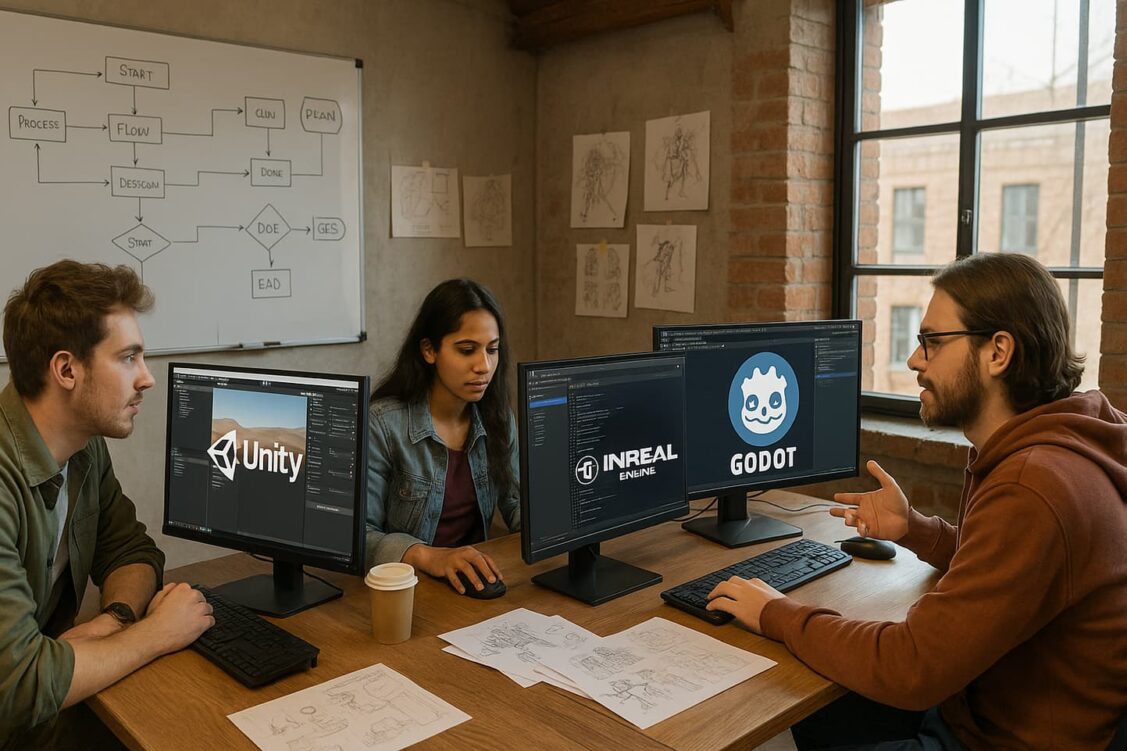
Last month, a promising indie developer reached out to our team at Devil Whiskey in complete frustration. After eight months building their dream RPG in GameMaker Studio, they realized the engine simply couldn’t handle the 3D multiplayer features they needed. They had to start over from scratch.
This scenario plays out more often than you’d think. Choosing the wrong game engine isn’t just a minor setback – it can kill promising projects before they ever see the light of day. With dozens of engines available, from household names like Unity and Unreal to specialized tools like Godot and Construct 3, making the right choice feels overwhelming.
After helping countless developers navigate this decision through our full-cycle development services, we’ve learned that success comes down to asking the right questions upfront. Here’s how to avoid that costly restart and pick an engine that will actually get your game to market.
Start With What You’re Actually Building
The biggest mistake we see? Developers falling in love with an engine before they understand their own project. Unity might be the world’s most popular game engine, but it’s overkill if you’re making a simple 2D puzzle game. RPG Maker could be perfect for your narrative adventure, but useless if you need mobile deployment.
Before you download a single engine, get brutally honest about your scope. Are you targeting PC, mobile, or multiple platforms? A pixel-art platformer has completely different needs than a 3D action game. If multiplayer is core to your vision, that immediately narrows your options – Unity’s networking tools and Unreal’s built-in replication can save you months of custom development.
The hard truth? Many indie developers dream bigger than their first project should be. There’s no shame in starting with something manageable in GameMaker Studio or Construct 3, then graduating to more complex engines as your skills grow.
Know Your Team’s Real Capabilities
Here’s where ego meets reality. Just because your programmer worked with Java doesn’t mean they’ll instantly master Unreal Engine’s C++. Unity’s C# might feel familiar to web developers, but game development has its own unique challenges.
We’ve watched teams waste months struggling with engines that assumed knowledge they didn’t have. If your artist is also doing some coding, visual scripting systems in engines like Unreal’s Blueprints or GameMaker’s GML can be lifesavers. Solo developers often thrive with engines that have robust asset stores and visual editors, reducing the need for specialized skills.
Time pressure changes everything. If you’re working with a tight deadline, choose the engine your team already knows, even if it’s not theoretically perfect. Learning curves are expensive, and deadlines are unforgiving.
The Money Talk Nobody Wants to Have
Free sounds great until you hit the fine print. Godot truly is free, which makes it attractive for bootstrap developers. But Unity’s “free until $100K revenue” and Unreal’s “5% after $1 million” models can bite successful games hard.
We’ve seen developers get shocked by hidden costs: platform deployment fees, collaboration tool subscriptions, asset store purchases that seemed optional but became essential. That $30/month GameMaker subscription starts looking expensive when multiplied across your team and timeline.
Think beyond launch day. If your game succeeds, how will your engine’s pricing scale? Some engines become more expensive as you grow, others offer predictable costs. Budget for success, not just survival.
Community Can Save Your Project
Documentation matters, but the community saves projects. When you hit that weird bug at 2 AM, you’ll pray someone else solved it already. Unity and Unreal benefit from massive communities generating endless tutorials, forum discussions, and Stack Overflow answers.
Smaller engines often have more intimate communities where you might get direct help from developers, but finding solutions takes longer. We’ve seen projects rescued by community-contributed plugins and abandoned when developers couldn’t find answers to critical problems.
YouTube tutorials, Discord servers, Reddit communities – these aren’t nice-to-haves, they’re project lifelines. Before committing to an engine, spend time in its community spaces. Are people actively helping each other? Are there recent tutorials for features you’ll need?
Test Before You Commit

Specifications lie. Marketing promises mislead. Only hands-on testing reveals how an engine actually behaves with your specific needs.
Build small prototypes of your core mechanics in your top 2-3 engine candidates. Does the 2D physics feel right? Can you easily implement your save system? How painful is the build process for your target platforms?
Pay attention to the daily workflow, not just the flashy features. If importing assets feels clunky or the debugging tools frustrate you, those small annoyances compound over months of development. We’ve seen developers switch engines mid-project simply because the editor workflow became unbearable.
Test deployment early and often. Some engines promise seamless multi-platform development but deliver headaches when you actually try to ship. Better to discover platform-specific issues during evaluation than after months of development.
Making the Call
Perfect engines don’t exist. Every choice involves trade-offs between power and simplicity, cost and features, learning curve and capabilities. The best engine for your project is the one that lets you ship a complete game, not the one with the most impressive feature list.
Remember, your first engine choice doesn’t define your career. Many successful developers started with beginner-friendly tools before moving to more sophisticated engines. The goal is finishing projects and building skills, not impressing other developers with your tool choice.
At Devil Whiskey, we work with all major engines because different projects have different needs. Whether you need full development support or just consultation during your engine selection, we’re here to help you make the decision that gets your game to market successfully.
The right engine is the one that ships your game. Everything else is just details.